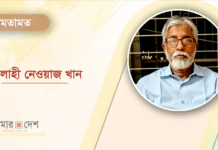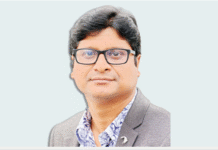In these stressful times, don’t forget mental health

Bangladesh needs a better mental health policy
Mental health refers to our cognitive, behavioural, and emotional well-being. It is all about how we think, feel, and behave.
Mental illnesses are more common than cancer, diabetes, or heart disease. According to a report of the WHO, the global cost of mental illness was nearly $2.5 trillion (two-thirds in indirect costs) in 2010, with a projected increase to over $6tn by 2030.
Evidence from WHO suggests that nearly half of the world’s population is affected by mental illness, with an impact on their self-esteem, relationships, and ability to function in everyday life.
An individual’s emotional health can also impact physical health, and poor mental health can lead to problems such as substance abuse.
Anxiety disorders are the most common types of mental illness. The individual has severe fears, or anxiety, which is linked to certain objects or situations. Most people with an anxiety disorder will try to avoid exposure to whatever triggers their anxiety. Examples of anxiety disorders include: Panic disorder, phobias, obsessive-compulsive disorder (OCD), and post-traumatic stress disorder (PTSD).
Mental illness is a global problem. More than 300 million people, 4.4% of the world’s population, suffer from depression. These alarming figures reflect the wider prevalence of mental illness more generally.
As a result, those who suffer from mental health issues such as violent abuse, negligence, anxiety, etc can access a trained community counsellor to whom they can talk to in their own indigenous language and find support, so that they can begin to rebuild their lives.
Before starting the counselling, the psychologists dealing with the patients must inform them about the procedure in relation to the treatment and then obtain their consent before starting the treatment.
The practitioners/counsellors must adapt a personalized approach that enables safeguarding to be done with the people who are suffering from mental health issues like trauma, negligence, depression, abuse, anxiety, and phobias.
They must ensure practices that focus on achieving meaningful improvements to people’s circumstances rather than just on investigations and conclusions, so that individuals may be safeguarded in a way that supports them in making choices, and gives them control in how they choose to live their lives.
A new Mental Health Act in 2018 was passed by the cabinet, which replaced the outdated 105-year-old Lunacy Act 1912. The act proposes harsher punishment to any medical practitioner if they are found guilty of intentionally giving a patient a false certificate of mental health.
Those guilty will be fined Tk3 lakh, or receive three years of imprisonment, or both, for such crimes under the new law.
However, certain segments of the act are under scrutiny, for instance, the provision of punishing medical practitioners if found guilty for providing false certificates of mental illness.
This might create fear about providing a formal diagnosis and subsequent care in ambiguous cases. Therefore, the new act might appear as a barrier to empathetic and proactive mental health care delivery instead of increasing access to the services.
Secondly, Bangladesh spends only 0.44% of its total health care expenditure on mental health, and there is no social insurance program to cover mental health services. The new act does not address this huge economic burden of mental health care, which remains a major weakness of the act.
And, of course, the new act has failed to acknowledge crucial issues such as confidentiality, accountability, and human rights aspects of mental illnesses.
Bangladesh does not have a distinct and robust mental health policy of its own. Thus, the lack of a strong and inclusive mental health policy to complement the strengths of the new act and to mitigate the weaknesses is an important quest for the nation.
At a time when a major illness in the form of Covid-19 is ravaging the world, the issue of mental health cannot be ignored.
Maisha Maliha is working as LEGAL Executive, HR, and administration at BRAC Institute of Educational Development (BRAC IED).









